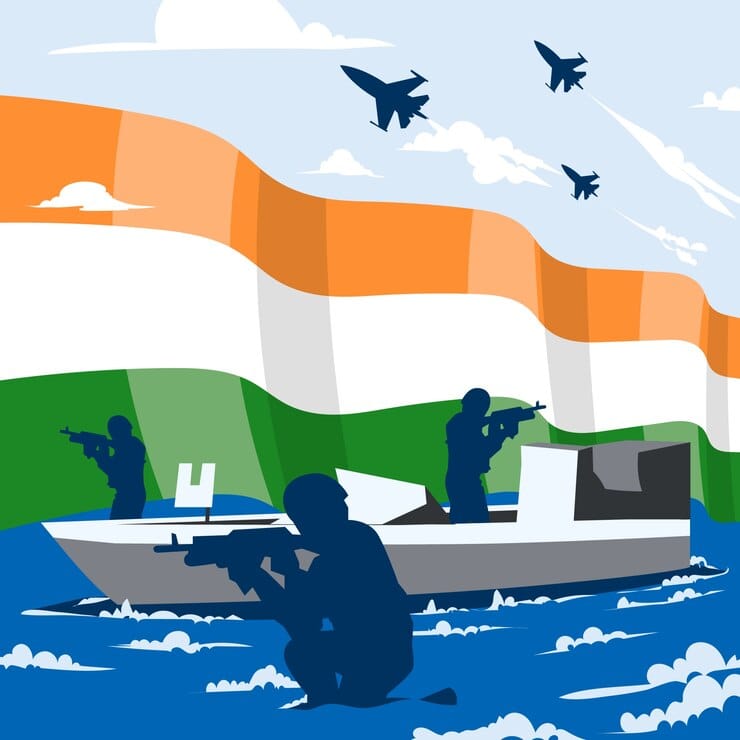Joining the Indian Army is a respected choice for many young Indians after completing their 12th grade. It’s a tough but fulfilling career that allows you to serve and secure the nation. Joining the esteemed Indian Army requires an understanding of the recruitment process.
Reasons to Join the Indian Army after the 12th Grade:
Navigating Eligibility Criteria for the Army
Entrance Exams for Joining the Army
Different Ways to Join the Indian Army:
Scope and What The Army Offers
Essential Skills for Army Professionals
Want to join the Indian Army after finishing 12th grade? This guide has all the details you need about eligibility, applying, selection, and training. Find out how to join through NDA and TES 10+2 Entry. Discover the different ways you can contribute to your country and build a meaningful career in the Indian Armed Forces.
Why Choose The Indian Army?
Joining the Indian Army is not just a career; it’s a prestigious and honourable choice. This profession involves challenges but also provides a unique chance to contribute to the nation’s safety and well-being. The dedication, discipline, and sense of duty needed in the Indian Army make it a highly respected and fulfilling path for those wanting to serve their country.
Reasons to Join the Indian Army after the 12th Grade:
1. Job Security: | Stable and secure career with growth opportunities. |
2. Prestige: | Being part of the highly respected Indian Army brings pride. |
3. Adventure: | Opportunities for travel exposure to different cultures. |
4. Training and Skill Development: | Excellent training for valuable skills. |
5. Service to Nation: | Contributing to the security and well-being of the country. |
6. The Benefits and Perks: | Housing, medical facilities, education, and pension. |
Your Role as an Army Officer
The Indian Army, as the largest branch of the Indian Armed Forces, plays a vital role in safeguarding territorial boundaries and preventing external threats. Many individuals consider working in this prestigious profession due to its honour and associated benefits.
What Is An Army Officer?
An Army officer is a leader above all. Like a manager in a company, they plan and assign tasks, ensuring work is done to the highest standard. However, officers lead by example, being willing to do any task they assign to a soldier, no matter how junior the officer is.
Even the newest officers manage over forty soldiers, a level of responsibility that might take decades in the corporate world. The integrity and conduct expected of an officer are high, given they make decisions daily involving millions of dollars and, often, the lives of the soldiers they lead.
Over time, three words—Duty, Honor, and Country—have become synonymous with being an Army officer, embodying the essence of their role.
Navigating Eligibility Criteria for the Army
NDA | Eligibility Criteria: – Educational Qualification: 12th pass or equivalent. – Age Limit: Between 16.5 and 19.5 years. For Females: – Eligibility: 16.5 to 19.5 years, 10+2 qualification. – Process: Apply online through UPSC, written exam, SSB interview, medical test. – Training: Three-year program at NDA, commissioned as officers. |
TES | Eligibility Criteria: – Educational Qualification: 12th pass with 60% marks in Physics, Chemistry, and Mathematics. – Age Limit: Between 16.5 and 19.5 years. – Only unmarried male candidates. |
IAR (Indian Army Rally) | Eligibility Criteria: – Educational Qualification varies based on the Soldier’s post. |
Army Exams: The Basics
1. National Defence Academy (NDA) Exam:
The National Defence Academy (NDA) stands out as the easiest route to join the Indian Army after the 12th. Serving as a joint defence service training institute, the NDA provides foundational training before candidates move on to specialised training academies. The NDA exam, conducted twice a year by the Union Public Service Commission (UPSC), is a comprehensive process involving written tests, SSB interviews, and medical examinations. Successful candidates proceed to undergo a rigorous three-year training program.
2. Technical Entry Scheme (TES):
For those inclined towards engineering, the Technical Entry Scheme (TES) is a viable option. This pathway involves qualifying in the TES examination, followed by enrollment in a prescribed Engineering Course of the candidate’s choice. Upon successful completion of the four-year Engineering course, cadets are granted a Permanent Commission in the Army with the rank of Lieutenant. This examination is conducted twice a year, and the selection process comprises two stages.
3. Indian Army Rally:
The Indian Army Rally provides an alternative pathway for candidates. These rallies are conducted across India to recruit candidates for various Soldier posts, including Soldier General Duty, Soldier Nursing Assistant, Soldier Clerk, Soldier Tradesman, and Soldier Technical. The selection process involves written tests, medical examinations, and fitness assessments.
All Army Recruitment Tests
1. CDS Exam | The Combined Defense Services (CDS) Examination conducted by UPSC is a national-level test for commission officer positions in the Indian Air Force, Army, and Navy. | Key details: – Exam Level: National – Syllabus: Maths, English, and General Ability Test (GAT) – Exam Pattern: Written exam in pen and paper mode – Test Cities: More than 70 – Frequency: Twice a year |
2. AFCAT Exam | The Indian Air Force conducts the Air Force Common Admission Test (AFCAT) for various positions like Flying Officer and Officer in the ground duty-technical post. | Important information: – Frequency: Conducted twice a year (February and August/September) – Eligibility: Varies for different positions |
3. CAPF Exam | The Central Armed Police Force (CAPF) Examination by UPSC recruits candidates for forces like BSF, CRPF, CISF, ITBP, and SSB. Details: | – Selection Process: Written, Physical, and Medical examinations |
4. ICG Exam | The Indian Coast Guard exam recruits candidates for Navik, Yantrik, or Assistant Commission positions. | Highlights: – Recruitment: Based on merit list |
5. IB ACIO Exam | The Intelligence Bureau Assistant Central Intelligence Officer examination. | The Ministry of Home Affairs recruits Assistant Central Intelligence Grade 2 Officers. |
6, INET Exam | The Indian Navy Entrance Test offers various Naval Force positions like Lieutenant, Commander, etc. | Must fulfil all eligibility criteria |
7. Territorial Army | This part-time army force, after the primary army, plays a crucial role in static duties and civil administration. | Educational Qualification: 12th pass with 60% marks in Physics, Chemistry, and Mathematics |
There are many opportunities for females and graduates to join the defence forces, along with options for candidates post their 12th standard. The defence exams serve as a gateway to the Indian Army, Navy, and Air Force, offering diverse career paths for aspirants.
Entrance Exams for Joining the Army
The main way to join the Indian Army is through the NDA (National Defence Academy). It involves written exams, SSB Interviews, and medical tests. The Indian Army’s key roles include ensuring national security, maintaining unity, protecting against internal and external threats, and managing peace within India’s borders. The army also engages in rescue operations during disasters and natural calamities.
Different Ways to Join the Indian Army:
1. National Defense Academy (NDA) Exam: | – NDA is a joint defence service training institute. – Conducted twice a year by UPSC (Union Public Service Commission). – Selection based on written exams, SSB Interviews, and medical tests. | NDA Written Test Exam Pattern: – Mathematics (300 marks, 150 minutes) – General Ability test (600 marks, 150 minutes) NDA SSB Exam Pattern: – Screening Test (900 Marks) – Psychological Test, Group testing, Officer Tasks, Personal Interview, Conference |
2. Technical Entry Scheme (TES): | – Another path after 12th. – Enroll in a prescribed Engineering Course. – After completing the 4-year Engineering course, granted permanent Commission in the Army as Lieutenant. – Conducted twice a year in January and July. | Exam Pattern: – General Knowledge, General Science, Maths, Computer Science, English. |
3. Indian Army Rally: | – Conducted for various Soldier posts. – Includes Soldier General Duty, Soldier Clerk, Soldier Nursing Assistant, Soldier Tradesman, and Soldier Technical. – Selection involves Written Tests, medical tests, and fitness tests. | Exam Pattern for Soldier GD Written Exam: – General Knowledge, General Science, Maths, Logical Reasoning. – Maximum Marks: 100, Passing Marks: 35, Time Duration: 1 hour. |
Scope and What The Army Offers
We understand you have dreams for your education and future career. If a hefty paycheck is your primary goal, a corporate job might be the obvious choice. However, let’s delve deeper into what makes a career truly excellent.
- The key attributes of a satisfying profession include:
– Professional Advancement |
– Job Satisfaction |
– Job Security |
– Economic Stability |
– Social Status |
– Quality of Life |
– Variety, and Adventure |
- If these factors align with your aspirations, then the Army is the perfect profession for you. The Army excels in offering these attributes, comparing favourably with any other service.
- We all know that promotions in any profession are competitive. The Army is no exception, but the competition here is fair, solely based on competence.
Future Growth And Prospects
In the Indian Army, growth involves progressing through commissioned officer roles. Promotions are based on performance, and officers can become generals after a minimum of 25 years of service.
Post-Retirement Benefits
– Pension at 50% of Last Pay Drawn |
– Death Cum Retirement Gratuity |
– Free Medical Treatment Including Dependents |
– Canteen Facilities as Before |
– Insurance Cover |
– Resettlement Opportunities |
– MBA Programme for Retired Officers |
– Training Programme for Officers |
The Directorate General Resettlement (DGR) ensures retiring officers are well-prepared for civilian life. Resettlement training courses, including those at reputed B Schools like IIMs, provide nationally/internationally accepted certifications. The courses cover various fields, ensuring officers can quickly find employment. The tangible value of these benefits surpasses what most private firms can offer.
Quality Of Life
- Joining the Indian Army at 21 provides a lifestyle unmatched by any other profession at such an early stage. What defines “Quality of Life”? A job with a high salary but long hours, no time for extracurricular activities, lack of adventure, and no social status. On the other hand, Army life offers:
– Challenge and adventure |
– Honour, prestige, and self-respect |
– Wholesome family life |
– Safety and security for the family |
– Love, respect, and esteem from India |
- The Army ensures physical and mental health, providing a quality of life unparalleled in any other service. Variety and adventure, from sports to exotic postings, make Army life more than just a job – it’s a fulfilling adventure. So, if you seek a profession beyond a mere job, embrace the challenge and join the Indian Army.
Essential Skills for Army Professionals
Army officers face physical challenges requiring robust physical and mental health. Strong general knowledge, a well-maintained physique, and qualifications in specific areas are essential.
An Army officer’s career involves a series of 2-3 year assignments, each preparing them for the next stage. The progression usually follows:
1. Lieutenant Phase: | Starting as a Second Lieutenant, the focus is on developing primary branch skills and leadership abilities. Promotion to First Lieutenant takes about two years. |
2. Captain Phase: | Captains gain experience as company commanders and attend advanced courses. Promotion to Captain takes about four years. |
3. Major Phase: | Promoted to major, officers become key staff officers, and some attend further training. Promotion to Major takes about 11 years. |
4. Lieutenant Colonel Phase: | This phase involves significant responsibilities, such as Battalion Commander, and officers may attend the Army War College. Promotion to Lieutenant Colonel takes about 17 years. |
5. Colonel Phase: | Assigned as a Brigade Commander, officers take on senior-level responsibilities. Promotion to Colonel takes about 22 years. |
6. General Officer: | Exceptional leaders become general officers, overseeing various levels of the Army. Promotion to General takes about 25 years. |
Conclusion
In the Indian Army, two main divisions—Combat and Non-Combat—offer diverse opportunities. Combat roles involve battlefield responsibilities, leading soldiers, and defending borders.
Non-combat roles, suitable for engineers, doctors, and other specialists, cover areas like telecommunication, signals, education, veterinary, and medical corps.
As the world evolves with challenges like the Cold War and social media conflicts, an army officer’s role remains vital, safeguarding the nation from internal and external threats.
FAQ
Q1. How to Join the Technical Branch of the Indian Army after the 12th?
To join the technical branch, apply through the Technical Entry Scheme. Candidates who completed class 12th with PCM and appeared for JEE-Mains can apply.
Q2. What Are the Different Entry Schemes After Class 12 for the Indian Army?
- The Indian Army offers entry through NDA, CDS, TES, and Soldier GD recruitment after class 12.
Q3. What Is the Selection Process for Joining the Indian Army After Class 12?
- The selection process usually involves a written exam, physical fitness test, medical check, and an interview.
Q4. What Are the Career Prospects After Joining the Indian Army?
- The Army provides opportunities for growth, leadership roles, specialisation, professional courses, and higher education.
Q5. Can I Join the Indian Army During My Final Year of College?
- Final-year engineering students can apply through UES, NCC Special Entry Scheme, or Short Service Commission Entry Scheme.
Q6. Can the Duration of Service Be Extended After Completing the Short Service Commission?
- Yes, it can be extended by another 4 years voluntarily.
Q7. What Is the Minimum Height Requirement for the Indian Army?
- The minimum allowed height is 157.5 cm, and weight should be proportionate to height.
Q8. Can a Married Man Join the Indian Army?
- No, married individuals are ineligible.
Q9. Can I Join the Indian Army Without Taking Any Exams?
- The Technical Entry Scheme (TES) allows candidates to participate in an SSB interview without a written exam after class 12.
Q10. Is It Possible for Anyone to Join the Indian Army?
- Only Indian citizens aged 18 to 42 years with a bachelor’s degree are eligible to join.










